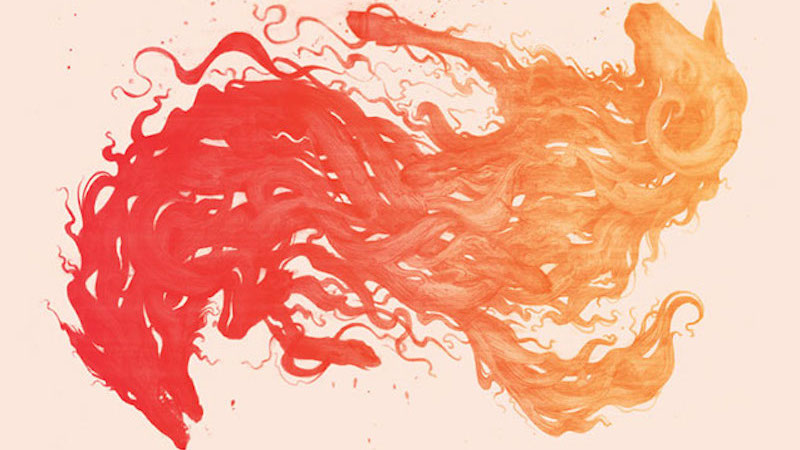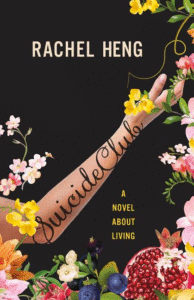
I was thinking of what I wanted to give you fine readers by way of a December book list, and rather than trying to do a Year’s Best or a Top Ten of 2018, I thought it would be more useful to recommend five books from the past twelve months that have stuck with me more than any others. These are the five that crop up in my thoughts when I wake up at 4:00am; these are the ones with scenes that play in my brain unbidden. I also find it interesting, and fun, that they’re all by women and cover wildly different themes. Come with me and you will find functional immortality, sympathetic monsters and monstrous mothers, a deep dark wood, ah! zombies! and, oh yeah, what kind of an SFF list would this be without a couple of fire-breathing dragons?
*

Suicide Club by Rachel Heng
(Henry Holt & Co.)
Suicide Club does something extremely difficult—it presents an incredibly bleak future, just a really dark future, but unlike in, say, Super Sad True Love Story, there isn’t much in the way of leavening humor. The basic plot is this: science has cracked functional immortality, and if you’re deemed genetically worthy you can sign up for all the procedures necessary to allow you to live at least 300 years. The catch being that you have to keep up an absolute, maniacal health regimen, and, oh yeah, society has bought so hard into the idea of longevity that most “fun” things have been made illegal—not just alcohol and meat, but passionate music (stress = cortisone), high-impact exercise (think of your joints), fruit (too much sugar!), hiking (are you nuts???)—to the point where people engineer their entire lives around the idea of simply surviving, just so that they can continue to show up to their non-stress-inducing jobs each day.
Heng asks such interesting questions in the book: about what makes life worth living, about what humans will do with near-immortality once they get it, and what happens to a family when macro decisions impact individual lives. The main character’s family is essentially split in half by the totalitarian government they’re living under, with Lea Kirino and her mother becoming true believers, and Lea’s father becoming so disillusioned that he flees into the wilderness. This book is not exactly fun, and it certainly isn’t an easy read, but I haven’t stopped thinking about it since I read it.
The Mere Wife by Maria Dahvana Headley
(MCD)
The easy tagline for this book is “Beowulf in the Suburbs,” but it’s so much more than just an updating of a classic. Maria Dahvana Headley plumbs the depths of female power and female rage. Grendel’s mother—a homeless, traumatized war veteran—tries to keep her boy as isolated as possible in order to keep him safe. (He might be a monster, but it’s unclear.) So what does sweet young Gren do? Well, naturally, he befriends Dylan, the son of Willa Herot, the queen bee of a planned community called Herot Hall. Willa then overreacts and calls in former Marine Ben Woolf to help her hunt down the “monsters” that are after her son.
Headley takes an ancient poem and weaves us a modern story that is every bit as poetic, but also angry, urgent, and vital reading for the current moment. Along the way her characters tell us so much about gender, motherhood, PTSD, adolescent lust, and the nature of the word “monster.”
Northwood by Maryse Meijer
(Black Balloon)
A tale of obsessive love, Northwood interrogates fairy tale and myth, remixing familiar characters in new settings and asking what happens when we follow real-life fairy tales to their logical conclusions. Where some modern stories take a single element or story, Meijer hops from Red Riding Hood to Rapunzel, from Ovid to the Tarot, always bringing everything back to that tender spot where a sense of identity meets raw desire. And her language is simply incandescent.
The Third Hotel by Laura van den Berg
(Farrar, Straus and Giroux)
The Third Hotel pulls off an impressive feat: it announces exactly what it’s about from the outset, calling attention to all the horror tropes it will be using on you—revenants, final girls, terrible places—and then, when it unleashes those tropes, it manages to make everything work. In fact, knowing what’s coming only serves to heighten the terror. And of course, like all great horror, the scary stuff weaves around a core of real, heartfelt emotion—in van den Berg’s portrait of a marriage filled with fissures, and in the raw grief and sense of unreality that follows death.
Much like Northwood, it packs all of this emotion and terror into a short, compact book that will just keep unfolding in your mind long after you’ve finished it.
The Sky is Yours by Chandler Klang Smith
(Hogarth)
Chandler Klang Smith’s The Sky is Yours is a great piece of alt/epic/bildungs/fantasy. Swan Lenore Dahlberg is set to marry Duncan Humphrey Ripple V, but both are so callow and detached from reality in different ways that the course of arranged marriage does not quite run smooth. Also, they’re living in a rapidly crumbling alternative New York City that is stalked, and occasionally charbroiled, by a pair of cranky, ancient, un-killable dragons.
This book is just stuffed with characters, themes, crazy ideas, subgenres, and self-contained side stories; it might seem like a lot, but trust me when I tell you that it all holds together. You’ll fall in love a couple of times, be infuriated once or twice, and I guarantee you won’t read anything else like this book this year, Or, most likely, next year either.
If you buy books linked on our site, Lit Hub may earn a commission from Bookshop.org, whose fees support independent bookstores.

